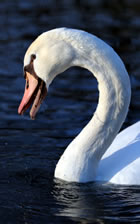“They’re like people in a heat wave waiting for the monsoon.”
Photo: A student sat barefoot in a flooded classroom at Lopang Domba Elementary School in Serang, Indonesia. The school has flooded during each monsoon season for more than seven years.
More in Pictures of the Day on Lens: http://nyti.ms/1bvsSpP
Oh, for the Days of a Courtly Vampire’s Love
By MIKE HALE
“True Blood,” which begins its sixth season on HBO, signals an effort to return to simpler story lines.
storyline
Pronunciation: /ˈstɔːrɪlʌɪn/
Definition of storyline
noun
Intel Historic Timeline
| 1989 Intel announces the 80486 processor Red X advertisement campaign begins, which is target directly at consumers, not manufactures ... |
Swan song
MeaningA final gesture or performance, given before dying.
Origin
 This term derived from the legend that, while they are mute during the rest of their lives, swans sing beautifully and mournfully just before they die. This isn't actually the case - swans, even the inaccurately named Mute Swans, have a variety of vocal sounds and they don't sing before they die. The legend was known to be false as early as the days of ancient Greece, when Pliny the Elder refuted it in Natural History, AD 77:
This term derived from the legend that, while they are mute during the rest of their lives, swans sing beautifully and mournfully just before they die. This isn't actually the case - swans, even the inaccurately named Mute Swans, have a variety of vocal sounds and they don't sing before they die. The legend was known to be false as early as the days of ancient Greece, when Pliny the Elder refuted it in Natural History, AD 77:"Observation shows that the story that the dying swan sings is false."Nevertheless, poetic imagery proved to be more attractive than scientific method and many poets and playwrights made use of the fable long after Pliny's observations. Chaucer included this line in the poem Parliament of Fowles:
The Ialous swan, ayens his deth that singeth. [The jealous swan, sings before his death]Shakespeare, the Swan of Avon no less, used the image in The Merchant of Venice, 1596:
Portia: Let music sound while he doth make his choice; then, if he lose, he makes a swan-like end, fading in music.The actual term 'swan song', with its current figurative meaning, doesn't crop up in print until the 18th century. The Scottish cleric Jon Willison used the expression in one of his Scripture Songs, 1767, where he refers to "King David's swan-song".
The poet Samuel Taylor Coleridge (1772-1834) turned the phrase on its head in the poem On a Volunteer Singer:
Swans sing before they die; ’twere no bad thingIf people ever did believe in the 'singing before death' story, few would now claim to do so. 'Swan-song' is now used figuratively and most commonly to refer to celebrated performers embarking on 'farewell tours' or 'final performances'. Those ironic quote marks were never more appropriate than in the case of Nellie Melba, whose swan song consisted of an eight year long string of 'final concerts' between 1920 and 1928. This led to the popular Australian phrase - 'more farewells than Nellie Melba'.
Did certain persons die before they sing.
The Phrase A Week newsletter goes to 93,500 subscribers (73,000 by e-mail, 20,500 by RSS feed).
Please help support this newsletter.
monsoon
Pronunciation: /mɒnˈsuːn/
Translate monsoon | into French | into German | into Italian | into Spanish noun
Origin:
late 16th century: from Portuguese monção, from Arabic mawsim 'season', from wasama 'to mark, brand'monsoon
- 音節
- mon • soon
- 発音
- mɑnsúːn | mɔn-
- レベル
- 社会人必須
- monsoonの変化形
- monsoons (複数形)
[名]
2 ((the 〜))(インド・南アジアの)夏モンスーン期, 雨期.
3 (一般に)季節風;海陸風;((略式))豪雨, 大雨.
[オランダ語←アラビア語mawsim(季節)]
mon・soon・al
[形]

沒有留言:
張貼留言